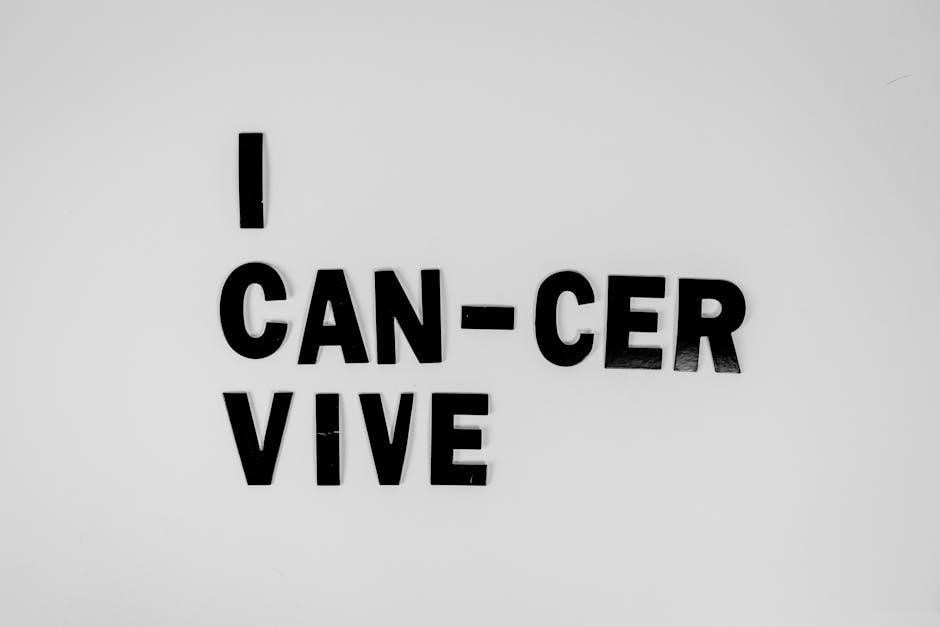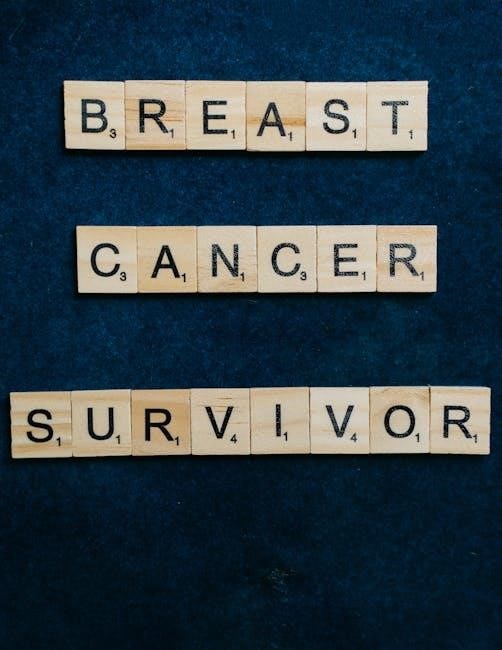Dr․ Patrick Walsh’s guide emphasizes the importance of understanding prostate cancer basics‚ offering a comprehensive resource for patients seeking to navigate diagnosis‚ treatment‚ and recovery effectively․
1․1 Understanding Prostate Cancer Basics
Prostate cancer arises in the prostate gland‚ a vital part of the male reproductive system․ It is one of the most common cancers among men‚ often progressing slowly․ Early detection is key‚ as it significantly improves treatment outcomes․ Understanding the basics involves knowing the function of the prostate‚ how cancer develops‚ and its stages․ Dr․ Patrick Walsh’s guide emphasizes the importance of education‚ helping patients grasp the fundamentals of the disease․ This knowledge enables men to make informed decisions about screenings‚ such as the PSA test‚ and to recognize early symptoms․ Awareness of prostate cancer basics empowers individuals to take proactive steps in managing their health and seeking timely medical advice․
1․2 The Importance of Early Detection
Early detection of prostate cancer is crucial for improving treatment outcomes and survival rates․ Dr․ Patrick Walsh’s guide highlights the significance of regular screenings‚ such as the PSA (Prostate-Specific Antigen) test and digital rectal exams․ These tools help identify cancer in its early stages‚ when it is most treatable․ Early diagnosis often leads to less invasive treatments and better quality of life․ Walsh emphasizes that awareness of symptoms‚ such as urinary difficulties or pain‚ can prompt timely medical evaluations․ His guide encourages men to take proactive steps in monitoring their health‚ ensuring they have the best chance of overcoming the disease․ Early detection is a cornerstone of effective prostate cancer management․

Treatment Options for Prostate Cancer
Dr․ Patrick Walsh’s guide outlines various treatment options‚ including proton therapy and surgery‚ emphasizing their pros and cons․ It focuses on non-invasive approaches for effective care․
2․1 Proton Therapy: A Non-Invasive Approach
Proton therapy is a cutting-edge‚ non-invasive treatment highlighted in Dr․ Patrick Walsh’s guide as a highly effective option for prostate cancer․ Unlike traditional radiation‚ proton therapy delivers precise doses of radiation directly to the tumor‚ minimizing damage to surrounding healthy tissue․ This approach reduces side effects such as urinary incontinence and sexual dysfunction‚ which are common with surgery or standard radiation․ Dr․ Walsh emphasizes its benefits‚ particularly for early-stage patients‚ as it preserves quality of life while effectively targeting cancer cells․ The guide also notes its growing availability and endorsement by the Prostate Cancer Foundation‚ making it a preferable choice for many patients seeking minimally invasive care․
2․2 Surgical Interventions and Their Implications
Dr․ Patrick Walsh’s guide thoroughly explores surgical interventions for prostate cancer‚ focusing on radical prostatectomy as a primary treatment․ He details the procedure’s goal of removing the entire prostate gland to eliminate cancer‚ while also addressing potential implications․ Recovery typically requires several weeks‚ with risks including urinary incontinence and erectile dysfunction․ Walsh emphasizes the importance of selecting an experienced surgeon to minimize these side effects․ The guide also discusses advancements in nerve-sparing techniques‚ which aim to preserve sexual function and urinary control․ However‚ Walsh cautions that surgery may not be suitable for all patients‚ particularly those with early-stage or localized cancer‚ where non-invasive options like proton therapy might be preferable․ He advocates for personalized decision-making based on individual health and cancer specifics․

Lifestyle Changes for Managing Prostate Cancer
Adopting healthier habits‚ like a balanced diet with fruits‚ vegetables‚ lean proteins‚ and grains‚ supports prostate health․ Exercise and a healthy weight aid in managing prostate cancer‚ as per Dr․ Patrick Walsh․

3․1 Diet and Nutrition Strategies
Dietary adjustments are crucial for managing prostate cancer․ Dr․ Patrick Walsh recommends incorporating fresh fruits‚ vegetables‚ and whole grains into meals․ Omega-3 fatty acids‚ found in fish like salmon‚ can reduce inflammation․ Avoiding processed foods and red meat is advised‚ as they may increase cancer risk․ Staying hydrated and maintaining a healthy weight through balanced nutrition supports overall well-being․ Additionally‚ antioxidants like lycopene‚ present in tomatoes‚ and selenium from Brazil nuts‚ are beneficial․ A structured diet tailored to individual needs can complement treatment plans and improve quality of life during recovery․ These strategies are detailed in Dr․ Walsh’s guide‚ offering practical dietary advice for patients․
3․2 Exercise and Physical Activity Recommendations
Regular exercise plays a vital role in managing prostate cancer․ Dr․ Patrick Walsh highlights the benefits of moderate-intensity workouts‚ such as brisk walking or cycling‚ to maintain physical health․ Strength training exercises can improve muscle mass and overall stamina‚ which is essential during treatment․ Yoga and flexibility exercises are also recommended to reduce stress and enhance mobility․ It’s important to consult with a healthcare provider before starting any new exercise program․ Consistency is key‚ as regular physical activity can aid in recovery‚ boost energy levels‚ and improve mental well-being․ These recommendations are outlined in Dr․ Walsh’s guide to help patients maintain an active lifestyle during and after treatment․

Mental and Emotional Well-Being
Dr․ Patrick Walsh’s guide underscores the emotional challenges of prostate cancer‚ offering strategies to manage stress and anxiety while fostering resilience and mental clarity during recovery․
4․1 Coping with the Emotional Impact of Diagnosis
Receiving a prostate cancer diagnosis can trigger a range of emotions‚ including shock‚ anxiety‚ and fear․ Dr․ Patrick Walsh’s guide highlights the importance of acknowledging these feelings and seeking support․ He emphasizes the value of counseling and mind-body practices to manage stress and emotional overwhelm․ Building a strong support network‚ including loved ones and support groups‚ can help patients navigate the psychological challenges of their journey․ Walsh also stresses the importance of maintaining mental clarity and resilience‚ which are crucial for making informed treatment decisions and staying proactive in recovery․ By addressing emotional well-being‚ patients can better cope with the diagnosis and its aftermath․
4․2 Building a Support Network

Dr․ Patrick Walsh’s guide underscores the critical role of a support network in managing prostate cancer․ He encourages patients to share their feelings with loved ones‚ fostering open communication and emotional connection․ Joining support groups can provide camaraderie and practical advice from others facing similar challenges․ Walsh also recommends seeking professional counseling to navigate complex emotions and relationship dynamics․ A strong support system not only alleviates isolation but also empowers patients to stay proactive in their care․ By surrounding themselves with understanding individuals‚ patients can gain the emotional strength needed to face treatment and recovery with confidence and resilience․

Patrick Walsh’s Approach to Recovery
Dr․ Patrick Walsh’s approach focuses on holistic care‚ emphasizing urine control and sexual function recovery; His methods aim to restore quality of life while combating cancer effectively․
5․1 Key Principles of Dr․ Walsh’s Philosophy
Dr․ Patrick Walsh’s philosophy centers on prioritizing patient-centered care‚ focusing on preserving quality of life; He advocates for non-invasive treatments‚ like proton therapy‚ to minimize side effects․ Recovery of urinary control and sexual function is emphasized‚ ensuring patients maintain dignity and normalcy․ His approach integrates advanced medical techniques with holistic well-being strategies‚ providing comprehensive support․ Walsh’s principles aim to empower patients‚ offering clear guidance on treatment options and lifestyle adjustments․ By addressing both physical and emotional needs‚ his philosophy fosters resilience and hope during recovery; His work underscores the importance of personalized care‚ tailored to each patient’s unique circumstances and goals․
5․2 The Role of Urine Control and Sexual Function Recovery
Dr․ Patrick Walsh underscores the critical importance of maintaining urinary control and sexual function in prostate cancer recovery․ His guide highlights advanced techniques to preserve these functions‚ ensuring patients retain their quality of life․ Walsh emphasizes that recovery is not just about eradicating cancer but also about restoring normal bodily functions․ He provides detailed strategies‚ including specialized exercises and lifestyle adjustments‚ to aid in recovery․ By prioritizing these aspects‚ patients can regain confidence and independence‚ fostering a more holistic approach to healing․ Walsh’s methods integrate medical treatments with practical advice‚ offering hope and practical solutions for long-term recovery and well-being․

Navigating Treatment Decisions
Dr․ Patrick Walsh’s guide provides a clear framework for evaluating treatment options‚ emphasizing personalized care and informed decision-making to suit individual needs and preferences effectively․
6․1 Evaluating Pros and Cons of Each Treatment
Dr․ Patrick Walsh’s guide provides a detailed analysis of treatment options‚ highlighting the pros and cons of each approach‚ such as surgery‚ radiation‚ and proton therapy․ The book emphasizes the importance of considering individual circumstances‚ including age‚ overall health‚ and the stage of cancer‚ when making treatment decisions․ It also discusses the potential side effects and long-term impacts of each option‚ helping patients weigh the benefits and risks effectively․ By presenting information in layman’s terms‚ the guide empowers patients to make informed choices that align with their personal priorities and lifestyle‚ ensuring a more personalized and effective treatment plan․
6․2 Making Informed Choices for Personalized Care
Dr․ Patrick Walsh’s guide advocates for personalized care by helping patients evaluate their unique circumstances and priorities․ The book emphasizes the importance of understanding individual goals‚ such as maintaining urinary control and sexual function‚ while also considering overall health and lifestyle․ By providing clear‚ layman’s terms explanations‚ the guide empowers patients to collaborate with healthcare providers in crafting tailored treatment plans․ It also highlights the role of support networks and lifestyle adjustments in enhancing recovery outcomes․ This approach ensures that patients feel confident in their decisions‚ aligning their care with what matters most to them personally and medically․

Resources for Patients and Families
- Dr․ Patrick Walsh’s book provides a comprehensive guide for prostate cancer patients‚ offering insights into treatment options and recovery strategies․
- Recommended resources include the Prostate Cancer Foundation and National Cancer Institute-designated centers for specialized care and support․
7․1 Recommended Reading and References
For patients and families seeking detailed information‚ Dr․ Patrick Walsh’s Guide to Surviving Prostate Cancer is a highly recommended resource․ This book provides a clear‚ layman’s explanation of treatment options‚ including proton therapy‚ and emphasizes the importance of recovery strategies․ Additionally‚ The Prostate Cancer Test That Saved My Life by Dr․ Edward M․ Schaeffer offers a personal and scientific perspective on diagnosis and treatment․ Both books are praised for their accessibility and comprehensive coverage․ The Prostate Cancer Foundation and National Cancer Institute-designated centers are also excellent references for up-to-date information and specialized care․
7․2 Finding National Cancer Institute Designated Centers
National Cancer Institute (NCI)-designated centers are recognized for their cutting-edge research and specialized care․ Patients can locate these centers through the NCI’s official website‚ which provides a searchable directory․ These centers offer access to clinical trials‚ advanced treatments‚ and multidisciplinary teams of experts․ Dr․ Patrick Walsh’s guide highlights the importance of seeking care at such facilities‚ as they often provide comprehensive support services․ Families are encouraged to utilize these resources to ensure they receive the highest standard of care․ NCI-designated centers are a trusted option for those navigating prostate cancer treatment and recovery․
